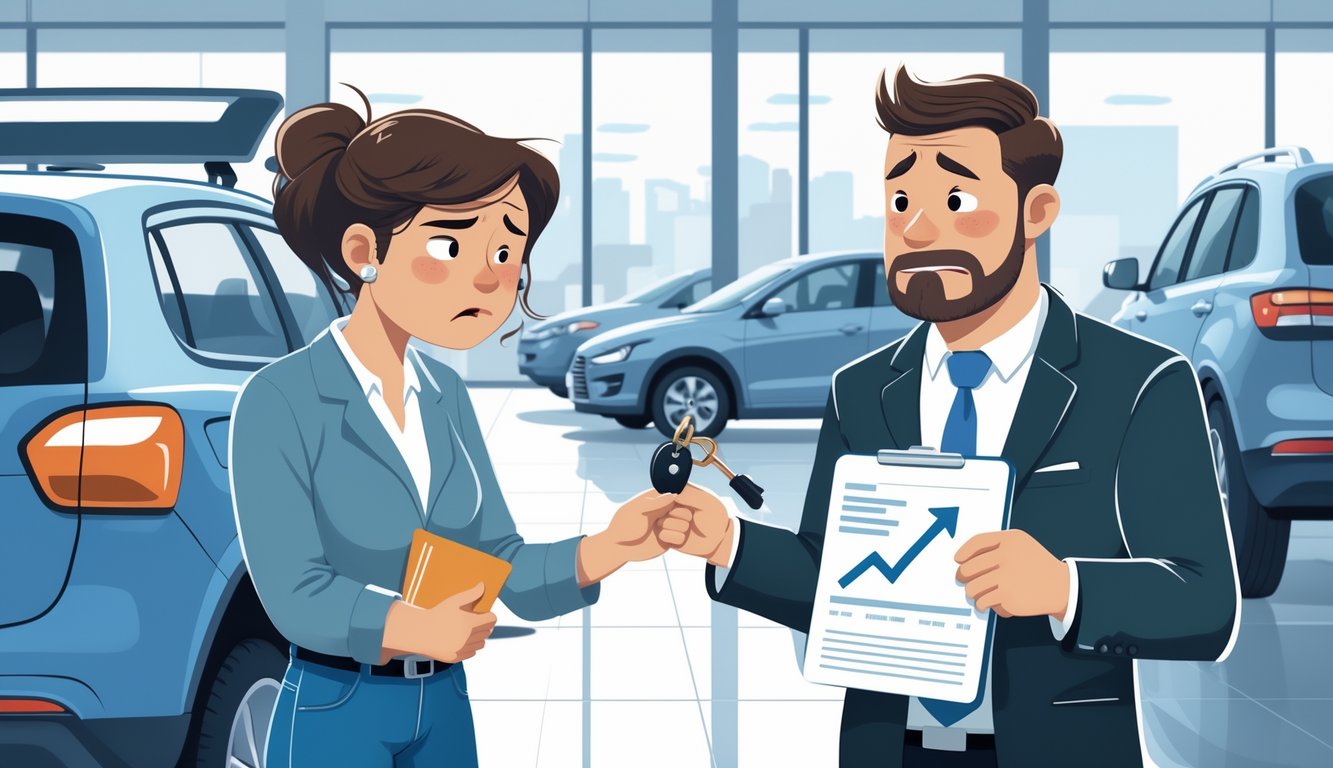
Why You May Receive Below-Market Offers Right Now
You see a “market value” online, then the dealer offers you half that. Feels like a joke, but nobody’s laughing. They say you’re saving time, but where does the money go? Somewhere between wholesale pricing and “instant cash,” your car’s value just disappears.
Market Fluctuations in Used Cars
Right now? Used cars aren’t the goldmine they were two years back. Heard a sales manager grumble that wholesale prices dropped 7% since January. Not that it helps when your family’s second car is suddenly “worthless.”
Prices bounce all over. National inventory spikes, repossessions up, and Manheim’s auction numbers change every week. Dealers get nervous, so your offer gets smaller. That “market value” on your app? Might be old news by the time you walk in. I checked mine the next day—already down $400. It’s exhausting.
Dealer Inventory and Wholesale Pricing
Picture a dealer’s back lot—half the cars flashing “check engine” lights. When they say “low trade-in,” it’s because they’re dumping cars at auction. A friend in finance told me 40% of trade-ins this quarter got shipped straight out. Storage and recon costs eat up profit, so they lowball harder.
Wholesale value rules. If the auction price for your Explorer is $12,600, that’s your ceiling—minus “reconditioning” and whatever else they invent. I lost a pair of sunglasses in a trade-in last year. Never saw them again.
If there’s too much inventory—off-lease cars, fleet returns—dealers just aren’t paying more. It’s about volume, not helping you out. That’s the game.
The Convenience Factor and Instant Cash Offers
Okay, so am I the only one who sits there doing the math—like, how much is my time at the DMV really worth? Is it $1,500? Probably not, but then again, I’ve spent way too many hours scrubbing crumbs out of cupholders just to squeeze out an extra hundred bucks on a private sale. Convenience always wins, even though it’s basically just a slow leak from your bank account. Instant cash offer tools? Yeah, they look cool—click here, get a quote, maybe snag a free coffee, whatever.
But let’s be real: every so-called “instant” offer I’ve ever gotten hovered around 75-85% of what CarGurus or KBB says my car’s worth. There was this Reddit post I read (while avoiding work, obviously) where people basically admitted they’re just paying for the privilege of not dealing with strangers or paperwork. Nobody brags about these deals, by the way. They just mutter about how at least it’s done, then spend the next month thinking about what that $1,500 could’ve bought—like, I don’t know, a new set of tires, a weekend away, or maybe just not feeling ripped off.
Whenever someone shrugs and says, “At least it’s over,” I think of this guy who dumped his GT500 for $10K less just to avoid private sale hassle. That gap? It’s more than my entire down payment on my first car. I swear, convenience is like a subscription you never meant to sign up for—only you pay in regret.
Dealership Strategies That Can Shortchange Drivers
You’d think trading in a car would be straightforward—walk in, get a number, move on. But, uh, nope. Underneath all those banners screaming about “top dollar for your trade!” there’s this weird, depressing routine where your “market value” evaporates the second you hand over the keys. Ask me how I know. Actually, don’t.
Lowball Offers and High Profit Margins
So last time I got an appraisal, the offer was so low I almost laughed. Like, were they pranking me? They mumbled something about “market conditions” and “wear,” but then, surprise, my car popped up online for $3,100 more the next day. Not suspicious at all, right? Supposedly, dealerships make $378 more per used car than new ones, but somehow the trade-in numbers always seem to go down for regular folks.
I’ve literally overheard managers telling salespeople to stick with the first offer unless someone brings in a printout from a competitor—which almost nobody does. One finance guy told me 77% of trade-ins come from people who’ve already committed to buying, so there’s basically zero leverage. The whole thing’s a mess. The numbers from those “trusted” car value sites? Never matches what the dealer scribbles on paper. If I wanted to give my car away, I’d just donate it and save myself the burnt coffee.
Bundling Trade-In with Purchase Incentives
“Incentive package”—I can’t believe we still fall for that. Trade in your car, get a $750 bonus, or maybe a slightly lower interest rate, but only if you buy a certified pre-owned, and only after you sign a stack of paperwork. Underneath all that, the real trade-in value just quietly disappears. I once thought I was getting a good deal, but then found out a $590 “doc fee” and some required add-on erased the “bonus” entirely.
Dealers love to mix everything together—rebates, discounts, trade-in credits—so you can’t tell what’s what. I’ve seen them use digital calculators to make the numbers look better than they are, then yank it all away in the fine print. It’s not just me, either; dealerships are getting sneakier about mixing incentives and credits so you never really know the real value. And those free car washes? Yeah, probably just a distraction while they skim a few hundred off your trade.
